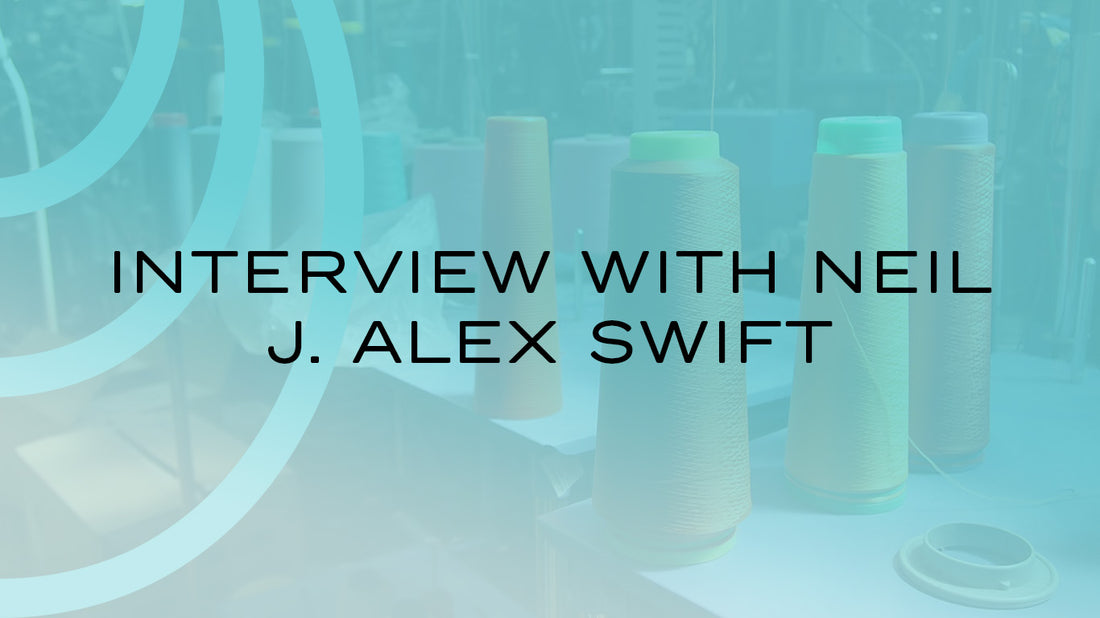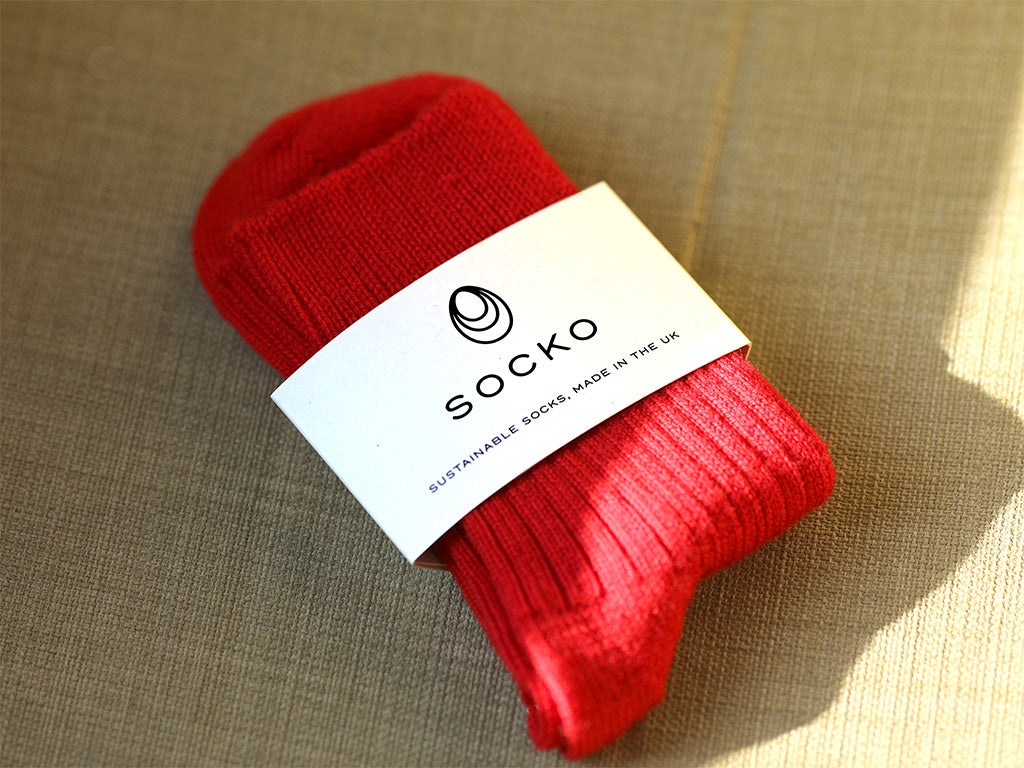
Interview with Neil from J. Alex Swift
Share
On our most recent visit to our manufacturers in Leicestershire we cornered Neil Swift, fourth generation director of sock factory J. Alex Swift. We asked him the all important questions about making in the UK and take a deeper dive into what goes into a great sock.
Can you start by introducing yourself and telling us a bit about the company?
My name is Neil Swift I run the company with my cousin Ian Swift, we’re the 4th generation to run the sock company. We started in 1895, that was John Alexander Swift, who made socks with a man called Mr Harriman. And when Mr Harriman died, he had no children, so the company became J. Alex Swift and we're pleased to say that we've been making socks ever since. And we're one of the few sock companies that are still around today.
How many people work at J. Alex Swift?
We have 25 people working here. The workforce has been pretty stable over the years. We've managed to not ever make anybody redundant. And yeah, managed to make enough socks to keep the workforce together.
What makes a great client relationship for you?
The nice thing is that we can really pick and choose which clients to work for and work with and we really like clients that have the same values. We don't really want to do cheap and cheerful socks. We want to do more upmarket special socks and they could be special in terms of special fibres or sustainability or regenerated fibres. So really if the relationship between two people works then we do business together.

And how often do you tend to take on new customers then?
Well, going back a few years, it was quite difficult in this country. So you did have quite a few new customers coming and going as well as your existing long-term customers. But now we've got to a state where the current customers are doing quite well with J. Alex Swift socks so the orders have been increasing substantially over the last 18 months. So we really have no capacity to take on any new customers. So if you've dealt with J. Alex Swift before, we're going to do our best to carry on making socks for you, but it would be unwise at this moment to take on any new customers.
Would you say that it's been the impact of Brexit and the fact that things are costing a lot more for people to import? Has it had a positive or a negative impact or a bit of both on you?
Yeah, there's a few factors. Obviously, we've just had the COVID epidemic. We didn't know how we’d fair in that and it turned out that people that were working from home wanted some luxury socks to lounge around in; we could provide that with an alpaca bed sock. People were able to do very few activities, but one was walking. We do specialise in a lot of walking and outdoor socks, so that played into our hands and the hands of our customers. So basically surprisingly, the COVID outbreak has increased orders for J. Alex Swift. Then on top of that, we've got big problems with costs and availability from products coming from abroad, so all of a sudden, more and more people are looking to have socks made in this country and obviously we are only a small collection of companies now around. But if somebody is going to look for socks in this country, they are almost bound to be inquiring at our door. That factor, and also the fact that people are preferring to have socks made in Great Britain rather than anywhere in the world, which they're not sure about. All those factors have brought home lots of orders in the current climate.

What do you think it is about UK made socks that makes them that much more special?
I think, you know, being a traditional company like we are we tend to think that we know what we're doing in terms of making socks and making a good sock that's going to give customer satisfaction and we're proud of making. So rather than a cheap and cheerful sock that's going to last a few wears, these will give good service for, in some cases, several years. I think it's the traditional skills that we have that makes a good sock.
How has the sock industry changed since you started?
Really, when I started, there were lots of sock factories around in Leicestershire in particular, Nottinghamshire as well, all making for chain stores, big volumes. All that business obviously has gone abroad now, so those that have survived all have a specialist skill; it might be, in our case, speciality yarns and luxury fibres, in other people's cases it could be school socks, it could be football socks. But what you really have to have is something that sets you apart from just making an ordinary black cotton sock.

How many steps are there to making a sock?
Well, we start off with getting the yarn and the way we make socks is usually a base yarn knitted in conjunction with stretch nylon. That gives the best properties you could wish for in a sock, which is stretch and recovery. And a little bit of strength and durability. So, once we've done the knitting, we have to toe-close the socks. We then send them off to be washed, often called scouring, that makes the nylon shrink to its final position. And then after washing the socks are pressed, then returned to Swift's where they are paired and examined, and we put on any packaging that the customer wishes to provide.
What makes a really great pair of socks?
Well, personally, I would like a pair of socks that you’re comfortable in all day. I’d go for something with maybe a loop inside, we do a lot of socks that are knitted on specialist machines that provide Terry loops and that means that walking around all day is like walking on air. And obviously it's the same sort of socks that you would use for walking or for leisure wear. So that's personally my favourite sock.

And approximately how many socks do you produce here each week?
At the moment we produce between 550 and 600 dozen a week. So I think that's around 7000 pairs of socks.
Why are socks counted by the dozen?
That's interesting and I thought that was strange when I first came into the industry; why isn’t it 10 of this and units of 100, but it actually works out really well in terms of packing socks. If you have 12 socks, you can put them in four lots of three, three lots of four, two lots of six. When you’ve got 10, it doesn't quite work. You don't make a nice pack, so having thought that we’ll change everything to tens, it turns out that I've just fallen into line with the industry and carrying on with twelves.

What are the main types of machinery that you have and could you maybe tell us the difference between a Bentley Komet and, say, a single cylinder machine?
We have a lot of traditional Bentley Komet machines, they’re double cylinder rib machines so that means you can pick whatever rib you require, you can have a rib top, and this is most important to give the ultimate comfort to a sock. When you're showing off a nice, fancy, expensive yarn like cashmere or alpaca or mohair, you really want a traditional rib machine to do that. We do have some single cylinder machines. They go much faster. They do need a lot more elastic to make the rib top, which some people find a little bit uncomfortable, so we have most of our plant on traditional double cylinder Bentley machines and then a small part of our plant on the finer gauge single cylinder machines.
How many machines do you have of each of those models?
We’ve probably got about 10 single cylinder machines and about 55 double cylinder machines. Some of the latest ones are only two or three years old and they come from Japan. They’re still double cylinder machines, but everything's computer programmed rather than the manual changing of size or changing of rib, which takes a long time on a traditional Komet machine.

How do you ensure each pair of socks meet your high levels of quality control?
We have quite a lot of employees here for what we do. So, one person will empty the machines very regularly, turn each sock inside out, check for faults, and when it's OK they will put it into a bundle which will go to the next process. Many companies would have night shifts - 24 hour working, not much supervision, not much checking and then that way you get a lot of socks that you really maybe don't want. We find it better to just work the days with constant checking of the socks by the knitters to ensure that we try not to waste too much yarn and too much fabric.
And finally, in terms of the future of socks, what do you think is the biggest opportunity for British made socks in the coming years?
There definitely is a big opportunity. I would really like some sock factories to either start up or expand. This is because suddenly it’s becoming more difficult, more unpredictable to get items from the other side of the world and also the cost of getting items from the other side of the world has just ballooned out of all proportion. I think that if we have the skills, we would be well placed to increase production in this country.

Is that something that J. Alex Swift could potentially be directly involved with?
For us it's quite a new experience being so popular and having such a full order book. We would have quite liked it to happen 20 years ago when we were a little bit younger and we had a bit more appetite for expanding, but definitely the current conditions are right for J. Alex Swift to expand and make more. We are actually looking into people working an evening shift to increase our production.
Thank you so much Neil, I really appreciate it.
You're most welcome.



: invalid url input -->)